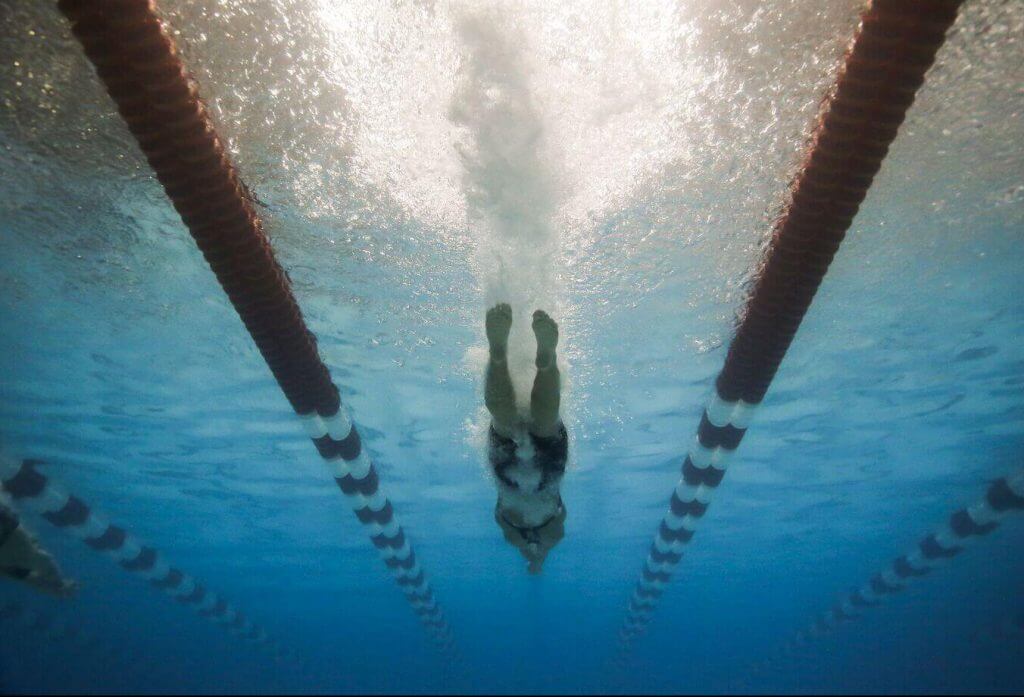For Seniors, Emotions Run High at Their Final Conference Championships

NCAA DI editorial coverage is proudly sponsored by Adidas. Visit adidasswimming.com for more information on our sponsor. For all the latest coverage, check out our event coverage page.
 CLICK FOR FULL RESULTS
CLICK FOR FULL RESULTS
By David Rieder.
Approximately one-quarter of swimmers arrive at their conference championship meets around this time of year knowing full well that they will not return. And towards the end of the meet, the finality often starts to kick in.
“It’s weird, but I’ve had a long time to prepare,” Leah Smith said, about 90 minutes after swimming her last race at the ACC championships. “We had our senior meet, our senior dinner, just various things that were my last whatever. Watching the seniors graduate last year, I kind of had a taste of it. Some of my best friends graduated, so this year’s a little weird.
“Even though it is my last year, I keep remembering that I’m not done with swimming. I’m just done with swimming in the NCAA collegiately. I’m still not by any means done.”
Smith, of course, will be among the top contenders at the NCAA championships in both the 500 and 1650 free, and after her career at Virginia concludes, she has designs on swimming professionally. That opportunity became a reality for Smith after she won an Olympic bronze medal in the 400 free this past summer and then brought home two Short Course World titles in December.
Olivia Smoliga and Michael Chadwick, two other seniors with pro swimming in their plans, simply viewed their final SEC championship meets as stepping stones towards the much bigger goals their respective teams had for the NCAA championships.
“It’s sad that it’s over, but it’s nice because it leads up to NCAAs, which I’m really excited for,” Smoliga said. “I don’t think the finality will set in until I touch my hand on the wall on that last relay at NCAAs.”
“It’s a little bit weird, but it feels pretty good. It’s crazy four years passed by so fast, but I’m happy the way it ended,” Chadwick said.
On the flip side of the emotional spectrum was Andrea Cottrell, who hated the idea that she wouldn’t be back with her Louisville teammates next year at ACCs. Cottrell has committed to swimming through this summer, but her long-term future in the sport is less certain.
“I don’t think it’s bittersweet. I think it’s just flat-out sad,” she said. “It’s not like, ‘Oh, I’m happy, and I’m sad.’ No, it’s not happy—it’s sad. I don’t like it, I don’t like being a senior, but I love racing for my team. I’m definitely going to miss it.”
But these four are part of a tiny subset of seniors whose accomplishments have earned them a chance to put off adulthood and continue training and competing for the foreseeable future.
For some others, like Auburn’s Ashley Neidigh, the NCAA championships will be the end of the line. Neidigh won the 1650 free at the SEC championships Saturday night, and now she has one more mile remaining in her career, at the NCAA championships next month. When she touches the wall in that race, her swimming career will be over.
“That’s going to be kind of heartbreaking for me,” she said. “The mile is my favorite event. I love swimming the mile—even though it hurts bad sometime. I’m looking forward to it, but I know I’m going to be really sad.”
But Neidigh, too, is among a minority group that has qualified for a national championship meet. For the vast majority of seniors at their conference meets—in Atlanta at ACCs, in Knoxville at SECs or every other meet else across the country—there’s no next step. This was the end.
As soon as the last prelims session at ACCs finished up Thursday morning, PA announcer Sam Kendricks asked for a round of applause. He wanted to give some recognition to the ladies who had just swam their final 200 back, 100 free, 200 breast or 200 fly and whose long careers in the sport had suddenly come to an end with little fanfare.
Kendricks had never met most of these women one-on-one, and most likely he never would, but for their efforts over four years and even before that, he figured they deserved, at the very least, this moment of recognition.
Two days later, during the final day of the SEC meet, South Carolina junior Taylor Worrell stood behind the blocks taking photos of her teammates during the early heats of the women’s 100 free. As her friends finished their races, Worrell ran over and wrapped them in long embraces.
No explanation was needed to figure out exactly what was going on—those races had been their last.
At ACCs, Duke’s Lindsay Schlichte swam in the third heat of the 1650, the last heat before warmups for the finals session. Her entire team gathered along the side of the pool to watch their captain race 66 laps one final time.
Schlichte, meanwhile, was doing all she could to keep herself focused on what she needed to do in the water—the Blue Devils, after all, needed every point they could get in a tight team battle against Virginia Tech.
“Before the race, the race shielded my emotional thoughts, but I took the time to remind myself, ‘This is your final meet warm-up. This is your final time putting on a suit.’ But I really think the mindset you get yourself into doesn’t let you feel those emotions, which is kind of sad, but I kind of needed to be in that mindset,” she explained.
“During the race, I really just tried to focus on my race plan, but towards the end, that’s what pushed me through when I started to get tired. ‘This is your last race. Leave everything you have in the pool. Fight to the end.’”
Schlichte touched the wall in 16:46.24, a lifetime-best time. As she climbed out of the pool and her teammates came over for hugs, the moment hit.
“Looking at the time, all the pain falls away, and you realize what happened,” she said. “It was your last race, your last swim. You’re done, and I think so many emotions hit you at once. I kind of broke down there.”
A chapter of her life that had stretched well beyond her four years swimming for Duke was now concluded, so Schlichte, like so many other seniors, had plenty of understandable reasons to cry.
All commentaries are the opinion of the author and do not necessarily reflect the views of Swimming World Magazine nor its staff.




.jpg)
